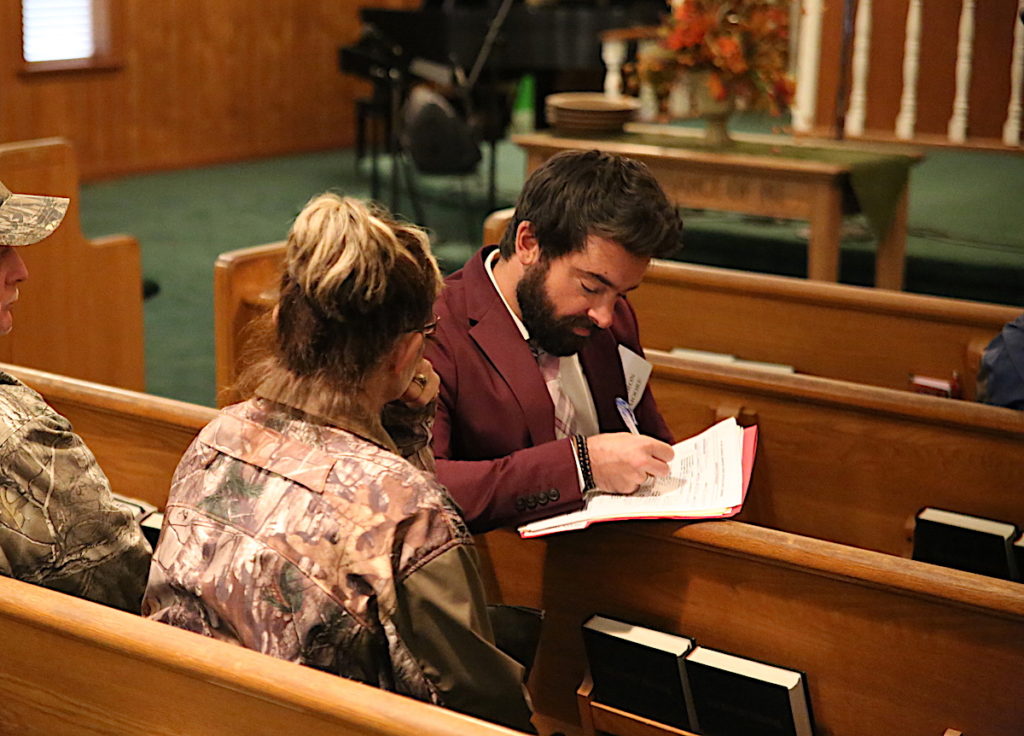For a group of University of Tennessee College of Law students, spending a Saturday in a rural county of East Tennessee showed them just how much the law degrees they’re earning can help them change lives.
The Legal Clinic students spent weeks preparing for the work that unfolded during the course of a few hours in the small sanctuary and packed fellowship hall of the First Baptist Church of Benton.
They traveled for nearly two hours from Knoxville to assist the residents of Polk County who attended the Legal Clinic’s expungement event on Nov. 23 hoping to clear their criminal records and regain control of their lives.
More than 20 law students and College of Law faculty prepared expungement petitions and motions to waive court costs while local judges volunteered their time to set up a makeshift courtroom to hear cases. Serving dozens of Polk County residents who braved the pouring rain, the students helped expunge 190 criminal charges in just one day.
“Working events like these remind you why you’re in law school in the first place,” first-year law student Olivia Kennedy said. “It’s an amazing thing that Professor [and Legal Clinic Director Joy] Radice and the community are doing, and I just feel fortunate to have been able to help.”
The event came about after the clinic was awarded a $100,000 grant by the Tennessee Bar Foundation. While the College of Law has been involved with expungement efforts for the last several years, the additional funding has helped expand the work.
“The grant was a dream come true,” Radice said. “It allowed us to hire a reentry fellow who can multiply our resources each year by bringing together members of the legal community to provide free legal services.”
In her position as the reentry fellow, Anna Rickels, a 2014 College of Law graduate, helps facilitate and organize the expungement events. The grant will also fund the development of a website that will offer free resources to Tennessee residents and a phone app to automate the generation of court petitions for expunging dismissed charges.
For residents of rural counties who “don’t have lawyers to help them with reentry, expunging charges, or removing court costs,” the grant directly influences their lives, Rickels said. “We’re trying to bridge the gap that prevents people in rural areas from accessing our justice system.”
10th Judicial District Public Defender Richard Hughes said he was inspired to become involved with the Legal Clinic and help organize the event in Polk County after he saw Radice and several students speak at a bar association meeting in Cleveland, Tennessee.
The goal is to help people leave with “a completely clean background check, no criminal history at all,” Hughes said. “You don’t want people to have some old arrest where the case was dismissed showing up.”
That scenario is a real possibility in Tennessee where a person’s criminal charges may still appear on their background check even after the charges have been dismissed, 10th Judicial District Assistant Public Defender John Fortuno said. People mistakenly believe because a charge has been dismissed that it’s also expunged, but taking the next step to file a petition and expunge the charge is critical.
Second-year law student Gordon Pera said he felt fortunate to be able to see such remarkable changes made in the lives of the people served by the clinic in just one day.
“For clients, getting these charges and convictions taken off their record means a new start and a clean slate, and you can see that relief on their face and hear it in their voice,” he said.
Third-year law student Aaron Moore said working at the event helped solidify his interest in practicing law in East Tennessee.
“I met a woman who did not even know she had any record at all until she went to buy her son a hunting rifle for Christmas and was denied. I enjoyed seeing how my effort will affect this family and their holiday. And that is just one of many stories,” he said.
“It really drives home just how much power there is in a license to practice law: it only takes a few minutes time and very little effort to wipe someone’s record clean.”
